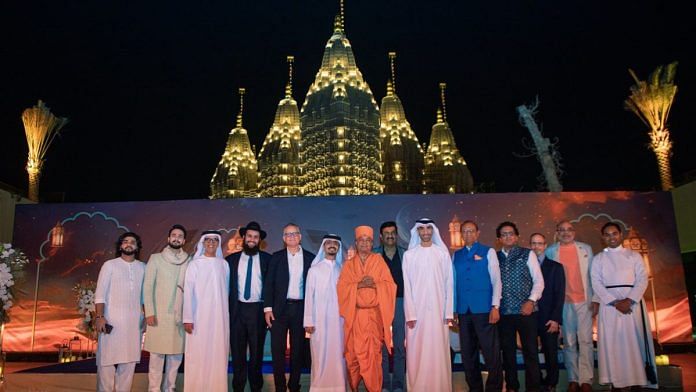Arab ministers and Sheikhs visiting the newly-inaugurated BAPS Hindu temple in UAE during the holy month of Ramazan is a significant moment of religious harmony and cultural exchange. Their ending their fast at the temple, after the Omsiyyat Ramadan Cultural Evening, is a perfect example of how we can coexist with mutual respect.
What catches my attention, as an advocate of secularism, is that, unlike some Muslim-majority nations, the UAE is able to respect Hinduism while upholding Islamic principles. This gives us hope, particularly in the context of India’s Hindu-Muslim relationship. India, with its substantial Muslim population, can take inspiration.
However, critics argue that the UAE’s efforts to bring interfaith harmony and religious reforms are solely driven by financial motivations. But in Abu Dhabi, where 96 per cent of the country’s oil reserves are located, such initiatives go beyond economic interests. Abu Dhabi’s commitment toward fostering religious acceptance and cultural inclusivity, as showcased by the BAPS Hindu temple event, seems like a genuine desire to promote harmony among different communities.
Additionally, it offers an important lesson to Indian Muslims. The centuries-old traditions of interfaith harmony in India, for example, Holi celebrations at dargahs, have often faced criticism from conservative elements within the Muslim community. Taking inspiration from nations such as the UAE, Indian Muslims can reinforce their position against traditionalist and conservative viewpoints.
Also read: Muslims must turn away from leaders like Mukhtar Ansari. They will not bring true reform
Inspiration for India, world
Embracing a narrative of coexistence not only empowers moderate Muslims but also challenges the rhetoric of Right-wing elements in both communities who propagate the notion of irreconcilable differences. The Hindu Right’s notion that Muslims are incapable of respecting other religions gets challenged by the example set in Abu Dhabi, where Arab Muslims participated in vegetarian iftar organised at the temple. Similarly, the assertion made by Muslim Right-wing individuals that their religion prohibits them from engaging with non-Muslims and respecting their faith is also debunked. Omsiyyat event highlights the fallacy of painting all members of a religious community with the same brush.
Another worrying trend is the tendency of certain individuals to apply double standards when discussing the Muslim community in India. On one hand, they capitalise on the generalisation that all Muslims are ‘intolerant’, using the argument to criticise Muslims in India. On the other hand, when events like the one in the Abu Dhabi temple take place, they shower praises on Arab Muslims while labelling Indian Muslims as inferior. This hypocrisy reflects a deeply ingrained bigotry and disheartening prejudices persisting in society. Muslims in India have long embraced the country’s ethos, which promotes harmony and respect for all faiths. While it’s important to draw inspiration from gestures of religious inclusivity from around the world, we must also acknowledge the traditions that have been deeply rooted in India’s history.
In the end, the BAPS Hindu Temple event has started a much-needed discussion in India and the world about coexistence, especially given the history of religious intolerance such as the prohibition of public Christmas celebrations in Tajikistan.
Amana Begam Ansari is a columnist and TV news panelist. She runs a weekly YouTube show called ‘India This Week by Amana and Khalid’. She tweets @Amana_Ansari. Views are personal.




This is a silly article that I didn’t expect from The Print.
Minorities in the UAE enjoy nowhere near the freedoms and benefits that they do in India, even now.
That’s why such a big deal is made of the UAE allowing a single Hindu temple to be constructed. How many mosques and churches does India have? Thousands.
All humans irrespective of their faith can coexist happily with no issues whatsoever till politicians stop poking nose and make agenda purely basis of religion.
Amanaji is expecting the opposite it is non Muslims who should shed Islamophobia
Emperor Akbar was famous for his holy celebration, emperor Aurangzeb also granted land and money to build hindu temples, muslim politicians also visit hindu temples in India.
It is only politics of religion
A logical corollary to that would be Muslims in India being treated with utmost fairness. Which is also their constitutionally guaranteed right. More visible in public life.